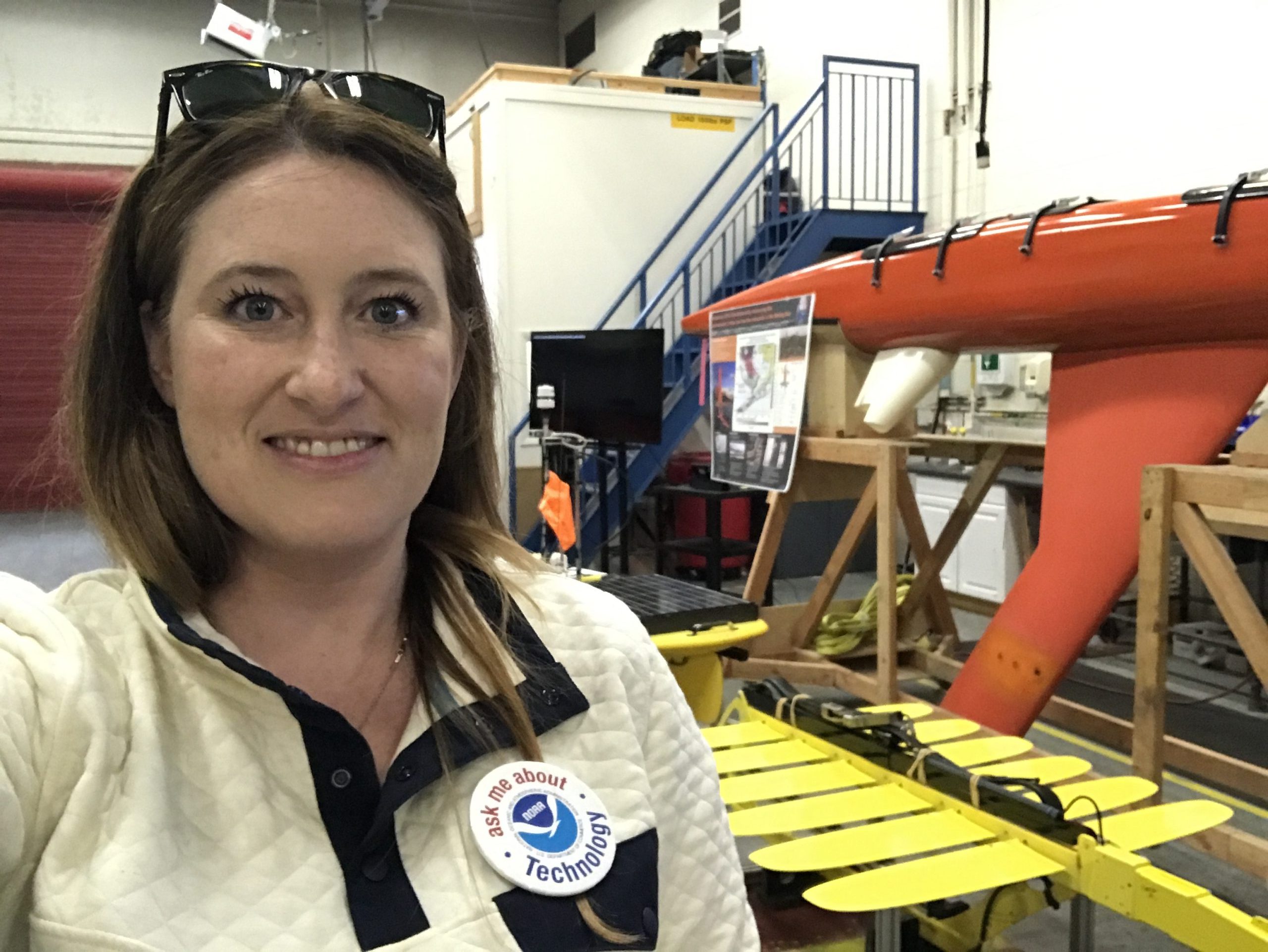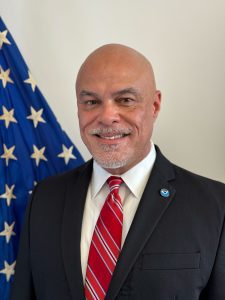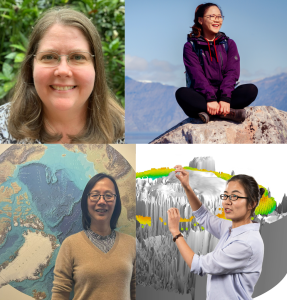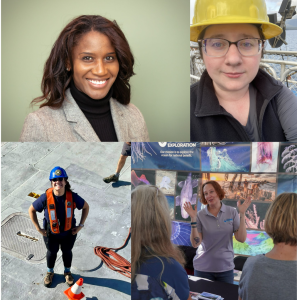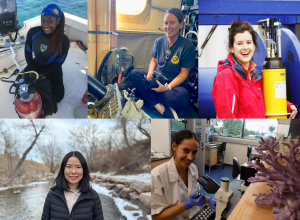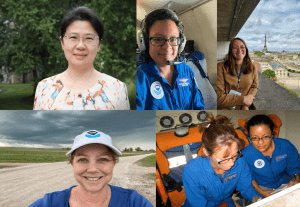Heather Tabisola is a research coordinator at the Cooperative Institute for Climate, Ocean, and Ecosystem Studies (CICOES) supporting NOAA’s Pacific Marine Environmental Lab. She describes her job as working at the interface across and between research and engineering to connect people and develop new tools to explore and monitor the ocean (including in the Arctic).
What drew you to your current career or field?
Very early on, I had a curious and joyous love of the shore and ocean and marine animals that communicate by making songs. In 1995, Sylvia Earle released the book “Sea Change.” I was 13 and it solidified that I wanted to be an ambassador for the ocean.
What is your typical day at NOAA like?
On a typical day, I’m up early to get ready and beat traffic. I drive to the NOAA Seattle campus each morning with my two children (ages four and two) who attend the daycare on campus. I drop them off at 7 a.m. and then head to my office.
My day always starts with reviewing my calendar and outlining goals and needs for the day with pen and paper. I then check emails for anything that needs to be addressed or added to my list. Hopefully I remember to make my coffee, and from there, it’s a blur until I pick-up the kids.
I coordinate and support research efforts for the Ecosystems and Fisheries Oceanography Coordinated Investigations (EcoFOCI) and the Innovative Technology for Arctic Exploration programs. While my roles vary slightly, my focus is organization across research and written and oral content for internal and external communications. I also organize and lead the EcoFOCI seminar series, a bi-annual series focused on fisheries and oceanography in Alaska’s marine ecosystems.
My time in the office is spent primarily in meetings or at my desk. On occasion, I go to sea and those days look very different! Or I travel to communities in Alaska and attend conferences in places near home, like Seattle, or farther away in Washington, D.C. or San Diego.
How has the pandemic changed your typical work day?
During the pandemic I have been thankful to lose the commute, but have gained two small coworkers, one of whom refused to let go of me the first few months. The other got an excessive amount of ‘working’ time on her iPad until a routine was established in the house. These routines tend to be short-lived and constantly evolving, and some haven’t been able to be sustained (for instance, at one point I was working from 5-7 a.m., caretaking sometimes until dinnertime, and then working in the evenings until I would fall asleep).
Working from home allows me to block time off and focus on the tasks at hand versus in a setting where I can’t close my door or don’t have the opportunity to lock-in. Oddly, I found myself more productive when the kids were home because I had to be so focused and intentional with my time. Now that they are back in daycare, I am a bit more open to conversations, meetings, etc. that I was not before. So, now it’s more of a blend, which I think has been a healthy change!
I’ve also been able to contribute to programs such as NOAA Live! to share some of the research and development work with Saildrones to kids and adults across the globe.
What were some of the challenges you faced this year? Have you been able to adapt and if so, how?
It’s hard to recognize challenges when I know and see so many folks across the globe that have faced losing loved ones, jobs, homes, the ability to provide for their families, and more to Covid-19. I am thankful for a working team that is compassionate; the ability to make boundaries when needed; and a healthy family with a roof over our head and a lawn to play in. I am also very thankful to our daycare staff and the fact that our daycare is open. Without it, I would be completely out of hours to take-off and properly give both my work and family the love and attention they deserve – and maybe, even, no longer in the workforce.
What experience or advice helps you when you’re faced with setbacks?
Always stay true to yourself and never let what someone else says distract you from your goals. Michelle Obama said it this way, and I like that she’s added “distract you” from your goals. I’ve been told I can’t have this career by teachers, by folks who I thought were mentors, and I’ve been on boats as the only female floating some 200+ miles offshore for months at a time. Put in the hard work, the really hard, roll-up-your sleeve type work, and it will not only shape your character — it will guide you in your life.
I would also add that it is important to seek out and establish your community. Life is hard and we humans are resilient, but the resources we have can uplift us and get us to where we want to be. I do not lean on my friends enough; it is my personality to fight alone. But in the darkest moments, it is my community who reminds me of what is next and helps me get there.
Have any opportunities opened up by the change to virtual-only work, or any unexpected benefits from working from home?
Yes! While I absolutely love to travel, I have appreciated attending conferences virtually and the creative ways that folks are working to create connections across technology.
Given the drastic changes in work environments, how do you see your workplace changing in the future, or what do you hope will change?
I hope for normalizing flexibility, a non-traditional office (the desire and ability to keep your team connected no matter where they are) and kids popping onto phone and video calls when you least expect them. I know there will be lots of innovation born from the pandemic, but I do hope to see some that address the inclusivity of caregivers while working from home.
Has your idea or definition of success changed in the past year?
I am not sure I know what success looks like for myself right now, because I am exhausted — but I will say that supporting others, uplifting others’ hard work, a “how can I help you”, “thank you” or even a “well done” — go a very long way.
What gives you hope, either with regard to science, your field in NOAA, or in general?
A generation of scientists willing to put in the work to diversify the field(s) and amplify voices that are required to save this planet and the people who rely on it.
What do you enjoy most about your work?
What I love about my work is connecting people, constantly learning, and sharing the extremely important work that my team carries out and making it digestible to someone not in the field.
What advice would you give to women who are starting out in their careers?
First, that it is important to have support — especially the support of other women. Build your tribe, choose people who will lift you up, and find people who make you better.
Second, that failure is an important part of growth, in life and work. Do not be afraid to fail, and do not be afraid to express what you need or want at that given time.
